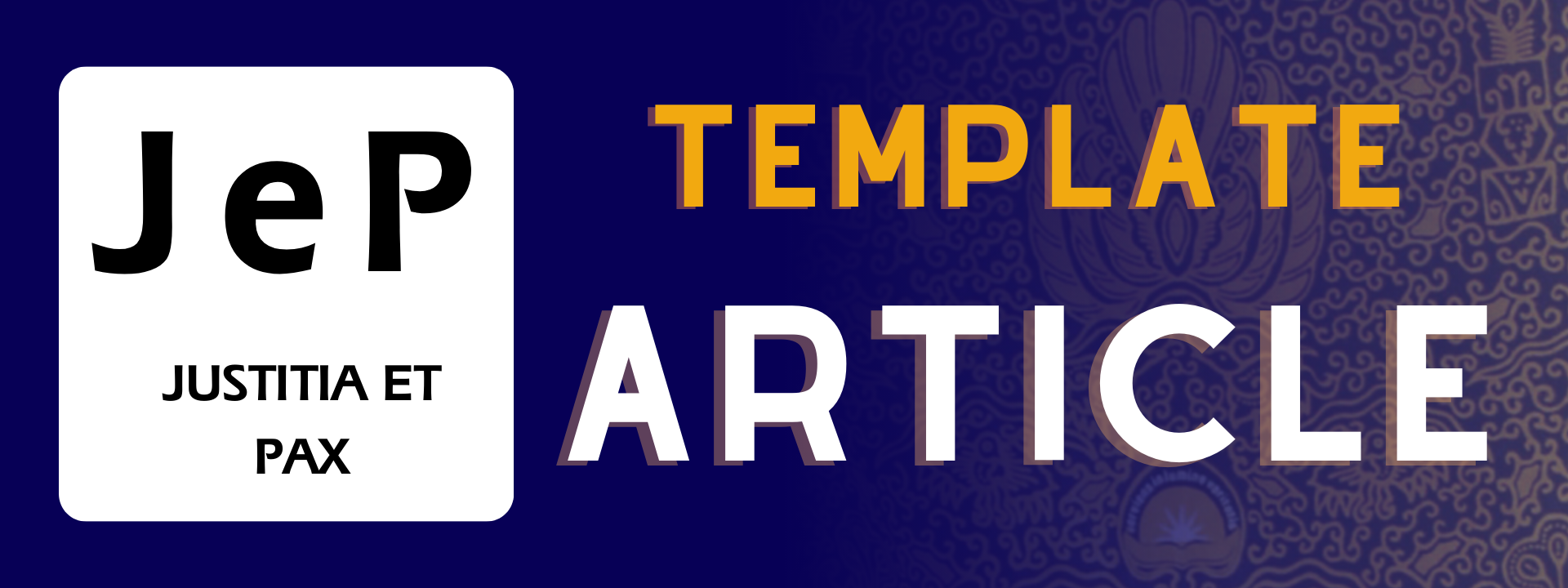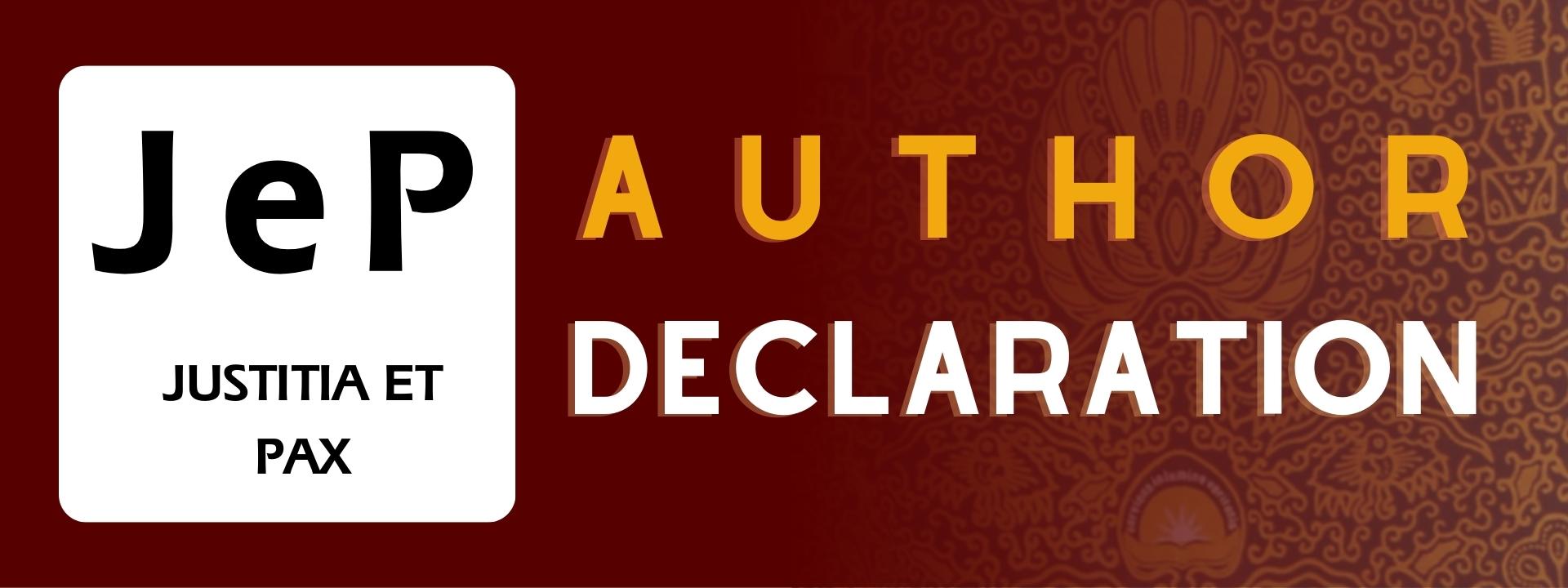JUDICIAL PARDON: ANTARA ABUSE OF PARDON POWER DAN PEMBAHARUAN HUKUM PIDANA
DOI:
https://doi.org/10.24002/jep.v40i2.8574Keywords:
Abuse of Pardon Power, Criminal Code, Judicial PardonAbstract
After 78 years of being subject to the Dutch legal legacy of Wetboek van Strafrecht (WvS), on December 6, 2022, Indonesia officially separated itself from Law Number 1 of 1946. Article 51 of Law Number 1 of 2023 contains the new concept of judicial pardon, a new addition to Indonesian criminal law. This study aims to analyse the formulation of the concept of judicial pardon in Law Number 1 of 2023 on the Criminal Code (KUHP) and examine indications of abuse of power by judges in the formulation of judicial pardon. This study employs a juridical-normative research method, which involves a legal review of the Law Number 1 of 2023, a conceptual approach to analyse the objectives and direction of policy, and a comparative approach to examine the formulation of judicial pardon in various countries. The study utilizes secondary data or library research. Based on the conducted discussion, it is evident that the concept of judicial pardon has been in existence for a considerable amount of time and has been implemented in various countries. We should guide Indonesia's adoption of the judicial pardon concept by studying its formulation in various other countries. Law Number 1 of 2023 formulation of the concept of judicial pardon is still considered incomplete, ambiguous, multi-interpretable, and susceptible to legal abuse. As a result, the concept of judicial pardon can potentially be misused by judges who have personal interests, resulting in abuse of pardon power, particularly in corruption cases.
References
Jurnal
Adhari, Ade, et.al., “The Ultimum Remedium Principal Formulation Policy Is Partial in Nature To Corporate Criminality in Indonesia”, Indonesia Law Review, Vol. 14, No. 1, 2024.
Adytia, Nur Amalina Putri, et. al., “The Rechtelijk Pardon Concept in Reforming the Penal System to Realize Restorative Justice in Indonesia”, Indonesia Law Reform Journal, Vol. 4, No. 1, 2024.
Akbar, Muhammad Fatahillah, “Pembaharuan Keadilan Restoratif Dalam Sistem Peradilan Pidana Indonesia”, Masalah-Masalah Hukum, Vol. 51, No. 2, 2022.
Alschuler, Albert W, “Limiting the Pardon Power”, Arizona Law Review, Vol. 63, No. 1, 2021.
Aprilianda, Nurini, “Menggali Makna Pemaafan Hakim Bagi Anak Melalui Ratio Legis Pasal 70 Undang-Undang Sistem Peradilan Pidana Anak”, Arena Hukum, Vol. 16, No. 02, 2023.
Aries, Albert, “Judicial Pardon as Perfection of the Implementation of Legality Principle in Sentencing”, International Journal of Research in Business and Social Science, Vol. 11, No. 1, 2022.
Barlian, Aristo Evandy A, dan Bagas Heradhyaksa, “Judicial Pardon as a Reform of Indonesian Justice System (Comparison of Judicial Pardon System Through Various Legal Instruments)”, ICIDS, January 2019.
______________________, dan Barda Nawawi Arief, “Formulasi Ide Permaafan Hakim (Rechterlijk Pardon) Dalam Pembaharuan Sistem Pemidanaan di Indonesia”, Law Reform, Vol. 13, No. 1, 2017.
Chen, Ben, “Elder Financial Abuse: Capacity Law and Economics” C,ornell Law Review, Vol. 106, No. 6, 2021.
Coffey, Ger, “A History of the Common Law Double Jeopardy Principle: From Classical Antiquity to Modern Era”, Athens Journal of Law, Vol. 8, No. 3, 2022.
Collins, Angela M dan Maisha Cooper, “Juvenile Waivers as a Mechanism in the Erosion of the Juvenile Justice System Angela”, Social Sciences, Vol. 13, No. 367, 2024.
Dewi, Sagung Putri M.E Purwani dan Putu Mery Lusyana, “Judicial Pardon: Renewal of Criminal Law Toward Minor Criminal Offense”, Yustisia Jurnal Hukum, Vol. 10, No. 3, 2021.
Eckstein, Paul F, dan Mikaela Colby, “Presidential Pardon Power: Are There Limits and, If Not, Should There Be?”, Arizona State Law Journal, Vol. 51, No. 1, 2019.
Estiningtyas, Aulia Rizka, Ulfatul Hasanah, dan Rusmilawati Windari, “Comparison of the Legal Regulation of the Rechterlijk Pardon in Indonesia and The Netherlands”, Jurnal Suara Hukum, Vol. 6, No. 1, 2024.
Faisal, et. al., “Genuine Paradigm of Criminal Justice: Rethinking Penal Reform within Indonesia New Criminal Code”, Cogent Social Sciences, Vol. 10, No. 1, 2024.
Farikhah, Mufatikhatul, “Rekonseptualisasi Judicial Pardon Dalam Sistem Hukum Indonesia (Studi Perbandingan Sistem Hukum Indonesia Dengan Sisitem Hukum Barat)”, Jurnal Hukum & Pembangunan, Vol. 48, No. 3, 2018.
___________________, “The Judicial Pardon Arrangement as a Method of Court Decision in the Reform of Indonesian Criminal Law Procedure”, PADJADJARAN Jurnal Ilmu Hukum (Journal of Law), Vol. 8, No. 1, 2021.
Hardicky, Nilvany, Riadi Asra Rahmad, dan Heni Susanti, “Policy Formulation of The Rechterlijk Pardon Concept (Judge’s Forgiveness) In Traffic Accident Criminal Cases”, Journal of Law, Politic anda Humanities, Vol. 4, No. 6, 2024.
Hariyanto, Oksep Adhayanto, dan Fihtriatus Shalihah, “The Purpose of Crimination Against Perpetrators and Victims in the Perspective of Restorative Justice”, Corruptio, Vol. 4, No. 1, 2023.
Hasibuan, Lidya Rahmadani, “The Concept of Restorative Justice in the Juvenile Criminal Justice System: A Narrative Review of the Indonesian Context”, Scholars International Journal of Law, Crime and Justice, Vol. 5, No. 7, 2022.
Hasibuan, Sahat Marisi, “Kebijakan Formulasi Rechterlijke Pardon Dalam Pembaharuan Hukum Pidana”, Jurnal Hukum Progresif, Vol. 9, No. 2, 2021.
Hidayani, Sri, “Criminalization and Decriminalization Policies in the New Concept of the Criminal Code”, Al-Qanun; Jurnal Kajian Sosial Dan Hukum Islam, Vol. 2, No. 4, 2021.
Hilliard, Christopher, dan Marco Duranti, “Human Rights at the Edges of Late Imperial Britain: The Tyrer Case and Judicial Corporal Punishment from the Isle of Man to Montserrat, 1972–1990”, Law and History Review, Vol. 42, No. 2, 2024.
Kukovec, Damjan,“Autonomy: The Central Idea of the Reasoning of the Court of Justice”, European Papers - A Journal on Law and Integration, Vol. 8, No. 3, 2023.
M, Andre Yosua, “Review Juridical Element Abuse Power In Action Criminal Corruption By System Law Criminal In Indonesia”, IJLCJ: International Journal of Law, Crime and Justice, Vol. 1, No. 2, 2024.
Manafe, Vita Adolfina dan Listiyowati Sumanto, “Asas Pemaafan Hakim (Rechterlijk Pardon) Sebagai Upaya Penyelesaian Tindak Pidana Ringan Untuk Pembaharuan Hukum Pidana Nasional”, Quantum Juris: Jurnal Hukum Modern, Vol. 6, No. 3, 2024.
Maulidah, Khilmatin, dan Nyoman Serikat Putra Jaya, “Kebijakan Formulasi Asas Permaafan Hakim Dalam Upaya Pembaharuan Hukum Pidana Nasional”, Jurnal Pembangunan Hukum Indonesia, Vol. 1, No. 3, 2019.
Meliala, Nefa Claudia, “Rechterlijk Pardon (Judicial Pardon) : An Effort Toward Criminal Justice System With Restorative Justice Paradigm”, Jurnal IUS Kajian Hukum Dan Keadilan, Vol. 8, No. 3, 2020.
Mellysa & Sri Endah Wahyuningsih Febriani Wardojo, “Development of Perspective Criminal Law Indonesian Noble Values”, Legal Standing Jurnal Ilmu Hukum, Vol. 2, No. 1, 2018.
Musa, M., et. al., “Guidelines for Implementing Imprisonment Sentences with Single Formulation (A Critique of Book I of the National Criminal Code)”, Law Reform: Jurnal Pembaharuan Hukum, Vol. 20, No. 1, 2024.
Najoan, Wiliam Aldo Caesar, Veibe V. Sumilat, Sarah D. L. Roeroe, “Penerapan Restorative Justice Dalam Penyelesaian Perkara Pencurian Ringan di Indonesia”, Lex Crimen, Vol. 10, No. 5, 2021.
Napitulu, Erasmus A.T, et. al., “Hukuman Tanpa Penjara Pengaturan, Pelaksanaan, Dan Proyeksi Hukuman Non Penjara Non Pemenjaraan Di Indonesia”, Institute for Criminal Justice Reform (ICJR), 2019.
Ngwoke, Rita Abhavan, dan Sogunle B. Abayomi, “An Appraisal of the Power of Pardon under Nigerian Law: Lessons from Other Jurisdictions”, Beijing Law Review, Vol. 13, No. 02, 2022.
Nugroho, Fajar Seto, et. al., “The Concept of Law Enforcement of the Crime of Theft through a Restorative Justice Approach”, Scholars International Journal of Law, Crime and Justice, Vol. 6, No. 08, 2023.
Nul, Lukman Hakim, et. al., “RKUHP: Judicial Pardon Concept In Corruption Crime”, Legal Brief, Vol. 11, No. 3, 2022.
Nyndhya, Rozzyana, Supardi, dan Handoyo Prasetyo,“Additional Criminal Restitution In The Handling Of General Criminal Cases By The Prosecutor’s Office”, International Journal of Social Service and Research, Vol. 4, No. 6, 2024.
Of, Analysis, et. al., “Analysis of Judges’ Decisions Who Are Free From The”, Journal of Indonesia Law & Policy Review, Vol. 4, No. 1, 2022.
Rumadan, Ismail, "The Harmonious Relation Building of Supreme Court and Judicial Commission To Implement Control Function for Honor, Dignity and Judges Behaviour", Jurnal Hukum dan Peradilan, Vol. 5, 2016.
Samusamu, Roygers, Jhon Dirk Pasalbessy, dan Sherly Adam, “Kebijakan Penanggulangan Prostitusi Online Melalui Media Sosial”, PATTIMURA Legal Journal, Vol. 2, No. 2, 2023.
Setiawan, Heru, et. al., “Digitalization of Legal Transformation on Judicial Review in the Constitutional Court”, Journal of Human Rights, Culture and Legal System, Vol. 4, No. 2, 2024.
Setyawan, Vincentius Patria & Itok Dwi Kurniawan, “The Urgence of Rechterlijk Pardon Regulation In Criminal Law Renewal”, Jurnal Inovasi Penelitian, Vol. 47, No. 4, 2021.
Solaiman, Sheikh, “Corruption and Judges’ Personal Independence in the Judiciary of Bangladesh: One Bad Apple Can Spoil the Bunch”, Cardozo Int’l & Comp. L, Vol. 6, No. 501, 2022.
Sukma, Fadjar, dan Chitto Cumbhadrika, “Urgensi Penerapan Rechterlijk Pardon Sebagai Pembaharuan Hukum Pidana Dalam Perspektif Keadilan Restoratif”, Gorontalo Law Review, Vol. 6, No. 1, 2023.
Sutrisno, Fenty Puluhulawa, dan Lusiana Margareth Tijow, “Penerapan Asas Keadilan, Kepastian Hukum Dan Kemanfaatan Dalam Putusan Hakim Tindak Pidana Korupsi”, Gorontalo Law Review, Vol. 3, No. 2, 2020.
Syahputra, Adery, “Tinjauan Atas Non-Imposing of a Penalty/Rechterlijk Pardon/Dispensa de Pena Dalam RKUHP Serta Harmonisasinya Dengan R KUHAP”, Institute for Criminal Justice Reform, 2016.
Unas, Sandro, “Kajian Yuridis Terhadap Bentuk Putusan Hakim Dalam Tindak Pidana Korupsi”, Lex Et Societatis, Vol. VII, No. 4, 2019.
Wojciechowski, Maciej. “Collegiality and Dissent in Polish Administrative Courts: Exploring Judicial Interactions.” Bratislava Law Review 8, no. 1 (2024): 49–66. https://doi.org/10.46282/blr.2024.8.1.741.
Yosuki, Aska, dan Dian Andriawan Daeng Tawang, “Kebijakan Formulasi Terkait Konsepsi Rechterlijke Pardon (Permaafan Hakim) Dalam Pembaharuan Hukum Pidana Di Indonesia”, Jurnal Hukum Adigama, Vol. 1, No. 1, 2018.
Yusuf, Muhammad Rifai, et. al., “Overview of the Judge’s Forgiveness Concept: Is Relation to the Legal Interests of Criminal Victims”, Walisongo Law Review, Vol. 3, No. 1, 2021.
Internet
CNN Indonesia, “Jokowi Resmi Sahkan KUHP Baru Jadi Undang-Undang”, https://www.cnnindonesia.com/nasional/20230102210655-12-895245/jokowi-resmi-sahkan-kuhp-baru-jadi-undang-undang, diakses tanggal 6 Januari 2023.
Indonesia Corruption Watch, “Hakim Agung Terjerat Korupsi: Momentum Bersih-Bersih Mafia Peradilan”, https://antikorupsi.org/id/hakim-agung-terjerat-korupsi-momentum-bersih-bersih-mafia-peradilan, diakses tanggal 6 Januari 2023.
International Commission of Jurist, “Judicial Accountability in Developing Countries Geneva", https://www.icj.org/new-report-summarizes-discussions-of-tunis-meeting-on-judicial-accountability/, diakses tanggal 6 Januari 2023.
Putusan Pengadilan
Putusan Mahkamah Agung Republik Indonesia Nomor 55/Pid.Sus-TPK/2016/PN Bgl. Atas Nama Terdakwa Janner Purba Dan Toton (Eks Hakim Di PN Kepahiang Dan PN Bengkulu).
Downloads
Published
Issue
Section
License

This work is licensed under a Creative Commons Attribution-NonCommercial-ShareAlike 4.0 International License.
Authors who publish with this journal agree to the following terms:
- Authors retain copyright and grant the journal right of first publication with the work simultaneously licensed under a Creative Commons Attribution License that allows others to share the work with an acknowledgement of the work's authorship and initial publication in this journal.
- Authors are able to enter into separate, additional contractual arrangements for the non-exclusive distribution of the journal's published version of the work (e.g., post it to an institutional repository or publish it in a book), with an acknowledgement of its initial publication in this journal.
- Authors are permitted and encouraged to post their work online (e.g., in institutional repositories or on their website) prior to and during the submission process, as it can lead to productive exchanges, as well as earlier and greater citation of published work (See The Effect of Open Access).

This work is licensed under a Creative Commons Attribution-NonCommercial-ShareAlike 4.0 International License.




















